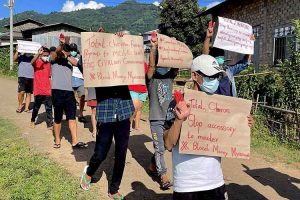United Nations (UN) human rights experts signed a joint note on Tuesday (7) condemning the military junta’s attempts to attack. Myanmar to establish a “digital dictatorship” against the country’s population.
Since the military coup in February last year, Myanmar’s civil society has been experiencing increasing restrictions on internet access, with intermittent shutdowns, censorship, surveillance and other barriers to free online access.
“The international community must not stand still while the people of Myanmar are systematically deprived of their fundamental rights guaranteed by international human rights law, such as freedom of expression, access to information and privacy,” UN experts said.
Myanmar population on the brink of ‘digital dictatorship’
Four experts from the organization signed the statement urging member states to condemn Myanmar’s restrictive internet policies. They say that without the digital access book, basic freedoms online and offline are at risk for the Burmese people.
“Access to information online is a matter of life and death for many people in Myanmar, including those seeking safety from indiscriminate attacks by the military and millions of people trying to navigate a devastating economic and humanitarian crisis.
The junta uses internet blackouts and invasive surveillance to undermine widespread popular opposition and continue its attacks on the people of Myanmar.”
The group is urging countries to impose sanctions against the Myanmar government and companies linked to the Myanmar military, including sanctions that restrict the sale or supply of dual-use surveillance technology.
An example of this technology is applications known as spyware, which are used by organizations that advocate freedom of the press against journalists and the general population.
Spyware is computer programs originally designed to combat crime and terrorism. However, this software allows malicious use for digital espionage against journalists, politicians, human rights defenders and civil society leaders.
In the case of Myanmar, similar technologies are used against the general population to monitor and censor content accessed online.
Therefore, UN experts also urged nations and international donors to support civil society initiatives to combat censorship and surveillance in Myanmar.
Read more
IFJ: Spyware media surveillance threatens press freedom
The statement released today was signed by the Special Rapporteur on the human rights situation in Myanmar, Thomas Andrews; Irene Khan, Special Rapporteur on the Promotion and Protection of Freedom of Thought and Expression; Ana Brian Nougrères, Special Rapporteur on the right to privacy; and Clément Nyaletsossi Voule, Special Rapporteur on the rights to peaceful assembly and freedom of association
Military dictatorship blocks access to websites and social networks in Myanmar
UN experts point out that after the February 1, 2021 military coup in Myanmar, the junta implemented nationwide internet cuts and blocked access to social media and messaging platforms.
More recently, the military has implemented targeted internet blackouts in areas where it has faced strong resistance from opposition groups.
Since August, 31 municipalities in seven states and territories have experienced disruptions in online access, and 23 cities have experienced slower internet connection speeds.
The organization’s special rapporteurs say the imposition of internet blackouts and drownings in many municipalities in the Sagaing region in early March coincided with the launch of a massive military offensive and campaign of violence and arson against the civilian population in the region.
read it too
Three journalists jailed in one week for ‘fake news’ in Myanmar
“Internet restrictions are being used by the junta as a cover to hide the ongoing atrocities,” experts say.
“Barriers to internet access hinder efforts by journalists, human rights monitors and humanitarian organizations to gather evidence of human rights abuses committed by the military or to serve communities at risk.”
“The lack of connectivity in large parts of the country also challenges our mandate to gather contemporary evidence of human rights abuses.”
According to the UN, the Myanmar military has blocked popular social networks in the country, including Facebook, which is considered the main communication and information sharing channel in Myanmar.
In addition, the government has forced internet service providers to raise mobile data prices and imposed new taxes on SIM cards, making internet access unaffordable for many.
Experts report that three of the four telecommunications companies operating in Myanmar have direct links with the military.
Telecom providers are also under intense pressure to enable surveillance technology and hand over user data to police and military authorities.
read it too
Multinational companies in Myanmar are leaving the country to avoid collaborating with the dictatorship
Two weeks after the coup, the government introduced a bill that would give authorities more power to block or restrict online content and ban the use of virtual private networks (VPNs) that help users circumvent digital censorship.
“The people of Myanmar need and deserve a strong international response to the junta’s attack on freedom of expression and access to information and the violation of the right to privacy, which threatens the lives and well-being of millions of people.”
“Member States must act quickly to curtail the junta’s efforts to bring Myanmar back into the digital dark age,” UN experts say.
NGO Access Now, which defends human rights in the digital environment, supported the United Nations’ statement and strengthened the call of the international community to support civil society against the “digital dictatorship” of the army.
“Myanmar’s military is intent on enforcing silence and expanding surveillance,” said Dhevy Sivaprakasam, Access Now’s Asia-Pacific policy adviser.
“They’re trying to ban VPNs through a bill to prevent people from accessing sites they desperately need, and pressure operators to enable blocking technologies and provide user data.
People will be punished – not just for their legitimate resistance, but simply for trying to connect with others. UN Member States and international donors must step in.”
read it too
source: Noticias
[author_name]


